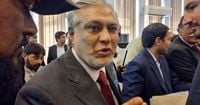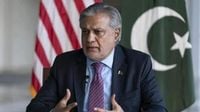In a significant diplomatic development, India and Pakistan have agreed to a full and immediate ceasefire, effectively ending a period of escalating tensions and military hostilities between the two nuclear-armed neighbors. The ceasefire was established through direct communication, with the Pakistan Director General of Military Operations (DGMO) initiating the call to their Indian counterparts.
On May 10, 2025, Pakistan's Deputy Prime Minister and Foreign Minister Ishaq Dar announced the ceasefire on X (formerly Twitter), stating, "Pakistan and India have agreed to a ceasefire with immediate effect. Pakistan has always strived for peace and security in the region, without compromising on its sovereignty and territorial integrity!" This statement marks a pivotal moment in the ongoing conflict that has seen both nations engaging in military action against each other.
Indian Foreign Secretary Vikram Misri confirmed the ceasefire, revealing that the DGMO of Pakistan contacted the Indian DGMO at 3:35 PM (IST). The agreement stipulated that both sides would cease all firing and military actions on land, in the air, and at sea, effective from 5:00 PM IST on the same day. Misri noted that instructions had been issued to both militaries to adhere to this understanding. The two DGMOs are scheduled to communicate again on May 12 at noon to assess the situation further.
This ceasefire comes on the heels of a series of military escalations that began on May 7 and 8, 2025, when India conducted airstrikes on nine terror camps in Pakistan and Pakistan-occupied Kashmir. These operations targeted bases linked to banned terrorist organizations such as Jaish-e-Mohammed, Lashkar-e-Taiba, and Hizbul Mujahideen. In retaliation, Pakistan launched high-speed missiles at military and civilian targets in India, including attempts to strike locations in Punjab.
While President Donald Trump announced the ceasefire on Truth Social, claiming it was achieved after a "long night of talks mediated by the United States," Indian officials refuted this assertion, emphasizing that the ceasefire was a direct bilateral arrangement. Misri highlighted that the understanding was reached without any third-party involvement, despite earlier communications from U.S. Secretary of State Marco Rubio, who had been in contact with both countries to help de-escalate tensions.
Trump's announcement, which congratulated both nations for their decision to cease hostilities, has been met with skepticism from Indian officials. They maintain that the ceasefire was a direct result of military discussions rather than U.S. mediation. Misri's statements during a press briefing underscored the view that Pakistan's actions had been "escalatory" and "provocative," leading to the recent military engagements.
The ceasefire is expected to bring much-needed relief to the region after days of heightened conflict and mutual accusations. As the situation stabilizes, both countries are hopeful that this agreement will pave the way for further diplomatic discussions aimed at addressing long-standing issues between them.
In a further development, Pakistan announced that it would open its airspace for all kinds of traffic following the ceasefire, a move that signifies a step toward normalization after the recent military confrontations. The Pakistan Airports Authority confirmed that all airports in the country would be available for normal flight operations, urging passengers to check with their airlines for updated schedules.
As tensions ease, the international community is closely monitoring the situation, with many nations advocating for a peaceful resolution to the ongoing conflict. The involvement of countries like Saudi Arabia and Turkey in the diplomatic efforts highlights the global interest in promoting stability in the region.
In summary, the ceasefire between India and Pakistan marks a critical juncture in their tumultuous relationship. With both sides agreeing to halt military actions, there is cautious optimism that this could lead to a more sustained dialogue and ultimately a resolution of the underlying issues that have plagued the two nations for decades.





